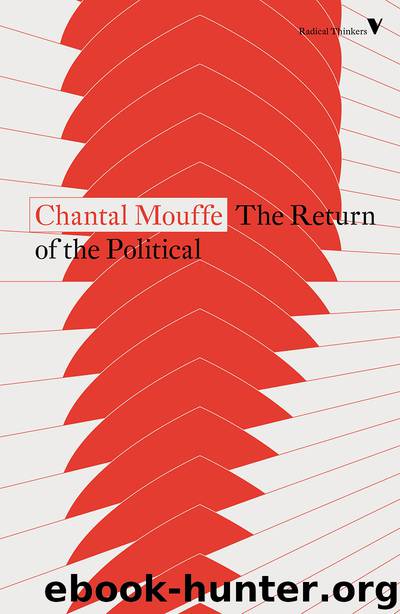The Return of the Political by Chantal Mouffe

Author:Chantal Mouffe
Language: eng
Format: epub
Publisher: Verso Books
Feminist Politics and Radical Democracy
As I indicated at the outset, there has been a great deal of concern among feminists about the possibility of grounding a feminist politics once the existence of women as women is put into question. It has been argued that to abandon the idea of a feminine subject with a specific identity and definable interests was to pull the rug from under feminism as politics. According to Kate Soper, ‘feminism, like any other politics, has always implied a banding together, a movement based on the solidarity and sisterhood of women, who are linked by perhaps very little else than their sameness and “common cause” as women. If this sameness itself is challenged on the ground that there is no “presence” of womanhood, nothing that the term “woman” immediately expresses, and nothing instantiated concretely except particular women in particular situations, then the idea of a political community built around women – the central aspiration of the early feminist movement – collapses.’15
In my view, Soper here constructs an illegitimate opposition between two extreme alternatives: either there is an already given unity of ‘womanhood’ on the basis of some a priori belonging or, if this is denied, no forms of unity and feminist politics can exist. The absence of a female essential identity and of a pregiven unity, however, does not preclude the construction of multiple forms of unity and common action. As the result of the construction of nodal points, partial fixations can take place and precarious forms of identification can be established around the category ‘women’ which provide the basis for a feminist identity and a feminist struggle. We find in Soper a type of misunderstanding of the anti-essentialist position that is frequent in feminist writings and that consists in believing that the critique of an essential identity must necessarily lead to the rejection of any concept of identity whatsoever.16
In Gender Trouble,17 Judith Butler asks: ‘What new shape of politics emerges when identity as a common ground no longer constrains the discourse of feminist politics?’ My answer is that to visualize feminist politics in that way presents a much greater opportunity for a democratic politics that aims at the articulation of the various different struggles against oppression. What emerges is the possibility of a project of radical and plural democracy.
To be adequately formulated, such a project requires the discarding of the essentialist idea of an identity of women as women as well as the attempt to ground a specific and strictly feminist politics. Feminist politics should be understood not as a separate form of politics designed to pursue the interests of women as women, but rather as the pursuit of feminist goals and aims within the context of a wider articulation of demands. Those goals and aims should consist in the transformation of all the discourses, practices and social relations where the category ‘woman’ is constructed in a way that implies Subordination. Feminism, for me, is the struggle for the equality of women. But this should not
Download
This site does not store any files on its server. We only index and link to content provided by other sites. Please contact the content providers to delete copyright contents if any and email us, we'll remove relevant links or contents immediately.
| Anarchism | Communism & Socialism |
| Conservatism & Liberalism | Democracy |
| Fascism | Libertarianism |
| Nationalism | Radicalism |
| Utopian |
The Secret History by Donna Tartt(16635)
The Social Justice Warrior Handbook by Lisa De Pasquale(11490)
Thirteen Reasons Why by Jay Asher(7794)
This Is How You Lose Her by Junot Diaz(5779)
Weapons of Math Destruction by Cathy O'Neil(5040)
Zero to One by Peter Thiel(4828)
The Myth of the Strong Leader by Archie Brown(4792)
Promise Me, Dad by Joe Biden(4451)
Beartown by Fredrik Backman(4423)
Stone's Rules by Roger Stone(4418)
How Democracies Die by Steven Levitsky & Daniel Ziblatt(4401)
The Fire Next Time by James Baldwin(4345)
100 Deadly Skills by Clint Emerson(4081)
A Higher Loyalty: Truth, Lies, and Leadership by James Comey(4035)
Rise and Kill First by Ronen Bergman(4014)
The David Icke Guide to the Global Conspiracy (and how to end it) by David Icke(3885)
The Farm by Tom Rob Smith(3873)
Secrecy World by Jake Bernstein(3785)
The Doomsday Machine by Daniel Ellsberg(3734)
